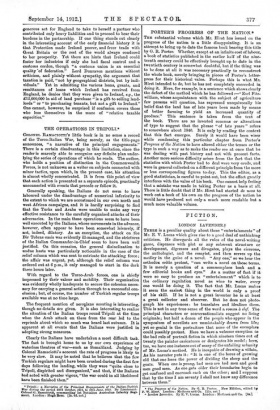PORTER'S PROGRESS OF THE NATION.. THE substantial volume which Mr.
Hirst has issued on the progress of the nation is a little disappointing. It is an attempt to bring up to date the famous book bearing this title by G. R. Porter. Whether, except at an infinite cost of labour, a book of statistics published in the earlier half of the nine- teenth century could be effectively brought up to date in the twentieth century is somewhat doubtful, but if the thing was to be done at all it was necessary practically to reconstruct the whole book, merely bringing in pieces of Porter's letter- press for their historical value. Perhaps this is what Mr. Hirst intended to do, but he has not completely succeeded in doing it. Here, for example, is a sentence which shows clearly the defect of the method which he has followed :—" Earl Fitz- william, whose acquaintance with the subject of agriculture few persons will question, has expressed unequivocally his belief that the land has of late years been made by means of better farming to yield an increased quantity of produce." This sentence is taken from the text of the book. There are no inverted commas or alterations of type to suggest that the phrase "of late years" refers to somewhere about 1840. It is only by reading the context that this fact emerges. Surely it would have been wiser while condensing this particular chapter from Porter's Progress of the Nation to have altered either the tenses or the type in such a way as to make the reader see at once that he was dealing with past history and not with present facts. Another more serious difficulty arises from the fact that the statistics with which Porter had to deal were very crude, and were in general collected on a different principle from the more or less corresponding figures to-day. This the editor, as a good statistician, is careful to point out, but the effect greatly interferes with the value of his book. One cannot help feeling that a mistake was made in taking Porter as a basis at all. There is little doubt that if Mr. Hirst had started de novo to work out a book of his own on the progress of the nation he would have produced not only a much more readable but a much more valuable volume.






































 Previous page
Previous page